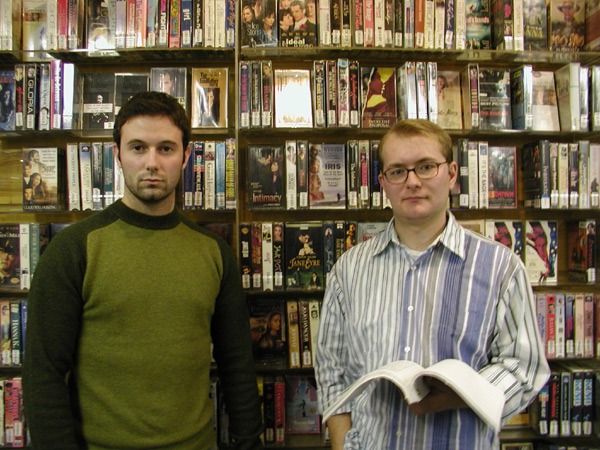
Company/Organization Profiles | Local Industry
Making Good
Written by Randy Steinberg | Posted by: Anonymous
Open any screenwriting magazine or visit the legion of film and screenwriting websites on the Internet and you will find myriad advertisements for script coverage services. What do they do? They assist novice and veteran screenwriters alike to sharpen their screenplays’ structure, characters, and dialogue. The catch: they can be expensive, and it’s hard to know which services are good and which are simply out to gouge earnest writers.
Enter Luke Poling and Tom Bean who plan to kick off No Good Scripts, their script coverage service with affordable rates and a new concept. Bean’s and Poling’s service differs from most in one interesting regard: they offer two reads for every script submitted. Just about every script coverage service has one reader evaluate a script and provide notes. "Patients go to doctors for second opinions," say Bean and Poling, "Why not the same thing for screenplays? You never know if a reader is not a fan of the genre or might not be simpatico with the material. We provide each customer looks from two professional script readers to double the amount of feedback and input a writer needs to get the best possible script."
Another interesting feature to No Good Scripts is the company’s website (www.nogoodscripts.com) where script coverage, with the writer’s permission only, can be posted for public viewing. In the tradition of Francis Ford Coppola’s "American Zoetrope.com" and Kevin Spacey’s "Triggerstreet.com," Bean and Poling are hoping to provide a forum where producers, agents, and writers can visit the site to view coverage of scripts submitted. If the writer wishes, his or her script’s coverage will appear on the site with a rating, a brief synopsis of the screenplay, and the comments of the readers. If a producer visits the site and finds a particular script interesting based on that coverage, for a small fee, the entire script will then be sent for viewing. Bean and Poling not only want writers to produce the best scripts possible, but they also wish to provide writers with exposure to peers and industry professionals and help them towards making a sale or a strong connection.
"Readers can visit the site to get a glimpse into what makes a certain script tick," says Poling. "As a writer, you’re looking for ideas and tricks to incorporate into your own writing. By posting the coverage online, we allow others to see where a script can fly or crash. Our goal is to provide visitors to the site a tutorial by looking at criticism of others’ works. It’s sort of like a discussion group where you sit in the corner and soak it all in."
But what about that strange name — No Good Scripts — and its origin? A few years back, No Good Scripts co-founder Tom Bean had a chance to meet one of his cinematic heroes, the legendary cinematographer Gordon Willis. Willis shot the famed films "Godfather,""Godfather II" and "Annie Hall" and is a two-time Academy Awards nominee. A few years back, Willis visited Boston University to deliver a lecture and Bean, who was a BU film school student at the time, asked Willis why he had stopped making films. The famous cinematographer’s reply was terse yet eye opening: Willis replied, "Because there are no good scripts."
But this wasn’t the first time that mantra had been uttered. Bean and his friend Luke Poling, an NYU film school graduate, noticed that throughout the industry, writers, actors, and producers were decrying the lack of strong material: "There are no good scripts," was a common refrain. Coupled with their own experiences in film school and as script readers for film production companies, Bean and Poling came together to form ‘No Good Scripts’ to reverse the trend they and others saw everywhere.
Poling and Bean have worked extensively in the industry as production assistants for the likes of Errol Morris and on films such as "Moonlight Mile" and "Session Nine." In addition, they have each worked on their own projects as director, writer, and producer. In short, they know what it takes to make a good film and they know where that starts –with the script. "This coverage is the same report that any studio or production company generates when they get a script," Poling explains. "However, they won’t let anyone outside the studio gates read it. No Good Scripts allows everyone to read it.
Furthermore, the costs are low. Most services begin charging at $300 per script and some reach as high as $500. And still more have added hourly consultation charges. The cost to the naïve, hungry writer can be enormous, and oftentimes, the service is impersonal and geared only towards profit. Poling strongly asserts, "There are no hidden costs for our service. One price fits all, and you can visit the site to see the quality of the reviews we’re offering. All of our readers have studied screenwriting and have read for production companies or agencies. These aren’t people we grabbed off the street; they’ve seen a ton of movies, and they know what they’re talking about."
Bean and Poling want a successful business to be sure, but their hearts are in the right place. To kick off No Good Scripts, they are offering two reads for $150 for every feature-length script with a turn around time of about two weeks. "Each writer receives two to four pages of coverage from two professional readers," Bean states. "Then, if the writer wishes, the coverage can be placed on the website. Not only do we want to help writers’ work gain exposure, but we also want the public to see the high-quality of our feedback. If you watch any red carpet special before the Oscars, when asked what attracted them to a particular project, almost every actor will say ‘the script.’ We want to help writers get their script into the best shape possible."
No Good Scripts will also read and evaluate short screenplays: for shorts the charge is $50. In addition, for only $50, a writer can have No Good Scripts read a redraft of a screenplay. At this point, one new reader will be brought in to read the script, while one of the original readers will evaluate the rewrite. "We know that 90 percent of writing is rewriting," Poling says, "and we want to see writers improve. That is our goal after all. Many other services ask for costly hourly ‘on-going’ consultation fees. We want to make that cost negligible to the writer."
In addition, for the duration of October, No Good Scripts is offering a special 15% discount to anyone who mentions New England Film.com and this article.
Bean and Poling can’t promise their rates won’t rise as the business gets its legs. Indeed, they want to craft and build a successful service, but they’re ideal is to create a forum devoted to helping fellow writers. "Our goal is to improve screenwriting," says Poling. "It’s great if someone who sends us a script gets an agent or a production deal out of it, but it’s also great if we can help a writer get that script a little tighter, a little more focused, a little closer to the idea that got the writer to writing in the first place."
Bean and Poling recognize that writers have different goals for their scripts. Some want to go the independent route while others have dreams of Hollywood stardom. Those considerations are important, but the goal of No Good Scripts is simple. It may sound like a paradox, but, essentially, all paradoxes are true, and as Tom Bean puts it, "No Good Scripts is all about good writing."
More information about No Good Scripts can be found at www.nogoodscripts.com.









